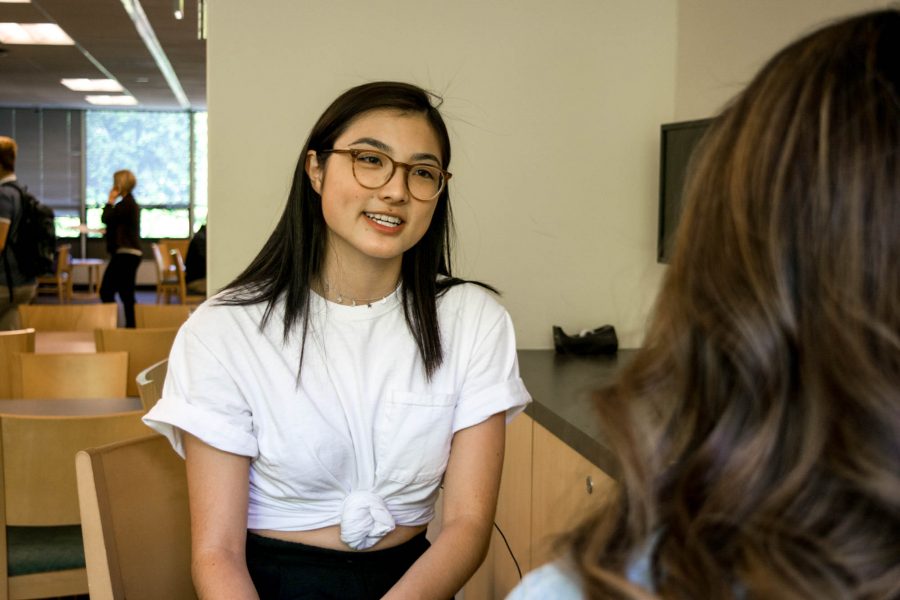Originally from Hawaii, Kailee Liu was looking back on her last two years at SPU, and reflecting on her own idea of racial identity, when she realized the lack of Asian-American representation in leadership and in faculty.
As Liu navigated ways of being Asian-American in a predominantly white space, she had the idea of creating an Asian-American club at SPU.
Liu knows that there are students who may have similar experiences to her; the experience of students of color on campus is different than the experience of white students, which she believes “is not a bad thing, but it definitely needs space.”
Liu understands that there are many Asian-American identities that are not associated with being specifically “Asian-American.” She emphasizes that in order for those identities to feel included, the club must be an all-inclusive space.
“I talked to a couple of good friends and we decided to create this club which we want to not be nationality specific because the Asian-American community at SPU isn’t that big,” she said.
Liu envisions a space for people to come together, to share experiences, and to share different experiences.
Her plan for club activities consist of inviting faculty speakers, discussions on what asian american leadership looks like, and to learn more about cultural identities through things such as documentaries, books and food.
“In my time period here, I haven’t found a space where for people that look like me, that capture experiences that are similar to mine, and so that’s really what we want,” Liu said.
Liu, along with fellow future officers Teresa Tsang, Drew Cortez and Elly Ha, are navigating many different ideas, deciding what the club will consist of.
“We’re hoping for the chance to take field trips off campus, go out to eat good food together, and attend different multiethnic events,” Liu said
Liu, who will also be part of Catalyst as a ministry programmer for the 2018-2019 school year, looks forward to working with other multicultural clubs to create an intersectionality between groups of students.
“We want to have panels with Black Student Union, Latinos Unidos, the other multicultural clubs, and our club not only to create solidarity within Asian-Americans on campus, but across with other students of color,” Liu emphasized. “It’s all about sharing experiences and really getting to live with people in solidarity as we all navigate this space.”
Liu has high hopes that, as a group of students, the club will be able to create more conversation around what it means to be Asian-American.
Through formulation of cultural identity, Liu has realized the difficulty in navigating this space is partially because of the model minority myth. A “model minority” is a demographic group based on ethnicity and race whose members are recognized to be more socioeconomically successful than the minority population’s average.
“The space we exist in isn’t really talked about, because we’re not black, we’re not latinx, we’re not white; we’re often used as a wedge between those spaces.
There just isn’t conversation, there isn’t celebration, there isn’t recognition of Asian-Americans who aren’t East Asian,” Liu said.
Although, at the beginning of this journey, Liu did not know whether an Asian-American club was something students would want to see, but once the news began to spread across campus, Liu began receiving facebook messages from Asian-American students who were getting excited about the club’s creation.
Liu received a message from one student in particular who was in tears at the news of an Asian-American club starting at SPU.
The student was a first year at SPU and didn’t feel like she had found a space to share with other Asian-Americans during her first year of college. Liu mentions that the student went as far as designing a T-shirt for the club in excitement.
“Things like that where we can see that it’s going to really matter to people is super encouraging,” she said. “It’s been really positive.”
Along with the other officers, Liu has received positive feedback from faculty and students on her mission to create a space for conversation among the Asian-American community.
“As far as faculty, I’ve gotten to speak to Dr. Bailey, Dr. Bantum, Dr. Leong, and others who are really supportive of the idea,” she said, adding that Dr. Yelena Bailey will be their club advisor.
“We that are putting together the club have really known her to be an activist for us and for identity development,” Liu said.
Liu, Tsang, Cortez and Ha mention that they would “love for her to feel welcome and included in that space, and that she can contribute in any way she feels fit.”
The Asian-American club is tentatively set to meet Wednesday nights at 7 p.m. every week.
“We’re starting to create space where our culture can be talked about and celebrated, that would be amazing. I know it’ll take more than one school year, but we just really want to get that started,” Liu said.















































































